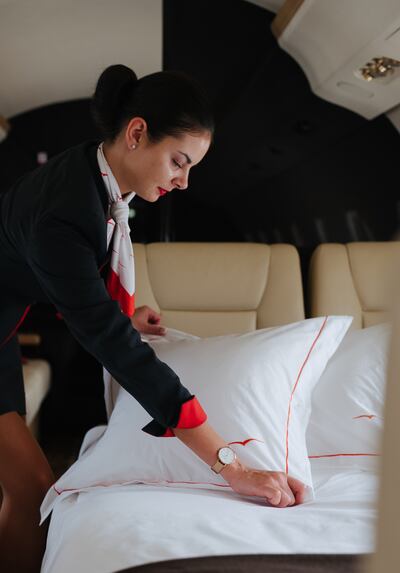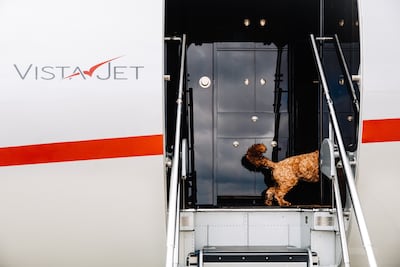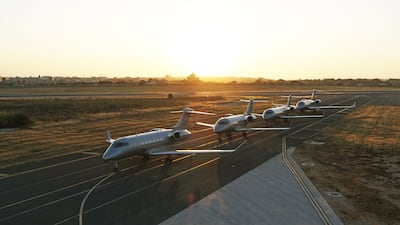“It was a status symbol; now it is a tool,” says Matteo Atti, VistaJet’s chief marketing officer, about shifting attitudes towards private jet travel.
Long considered a preserve of the very few, private aviation experienced a dramatic shift as a result of the pandemic. Pre-2020, the industry experienced an average annual growth of between two and five per cent. “It was quite a conservative market, as you might expect from very expensive items,” says Atti.
“Ninety per cent of people who could fly private before, never did. They would say: ‘We have the means, but we would rather spend the money somewhere else.’ It was not a necessity, unless you were a personality with privacy concerns.”
chief marketing officer, VistaJet
And then Covid-19 hit. In an uncertain landscape, private aviation offered reliability, consistency, control and social distancing. “When commercial travel went down, business jets said: ‘If you want continuity, this is the way to do it.’ And people were really looking for business continuity during the pandemic.”
Last year, VistaJet’s global revenue increased by 50 per cent compared to 2021. The number of flights operated by the company increased by 28 per cent, with the Middle East accounting for solid growth. Saudi Arabia witnessed a 72 per cent increase in flights year-on-year, while Qatar experienced an increase of 146 per cent, largely due to the Fifa World Cup. Dubai’s Al Maktoum International Airport was the most frequented airport in the Middle East for VistaJet members, and the sixth globally. The airline’s clients include royal families, heads of state, ultrahigh-net-worth individuals and leaders.

“Last year established the region as the power centre that is growing the most in the world. If you look at the US, it has been quite flat, Europe is reducing, Russia has disappeared and the Gulf has taken over. We’ve seen a lot more power in the region. And, as a result, we’ve seen our numbers organically skyrocket.”
This upward trend shows no sign of abating. Once you become used to the ease, flexibility and comfort of a private jet, it is difficult to go back to more traditional means of travel, it seems. “People will switch from work mode to family mode to celebration mode to time with friends in a second,” Atti notes. “The cabin has been designed as a home away from home, but also as a boardroom in the sky.
“They take video calls from there, or do board meetings. We’ve just finished refitting the entire fleet so the Wi-Fi is almost as good as home. It’s a gigantic infrastructure – thousands of satellites ensuring global coverage.”
VistaJet’s ultra-plush Bombardier Global 7500, the world’s largest and longest-range business jet, features four distinct living spaces, including a full-size kitchen and a bedroom. Throw in food by Michelin-lauded chefs and crew who have been trained by the British Butler Institute, and it’s no surprise customers are not rushing back to the drudgery of commercial travel.

On the ground, VistaJet offers access to Private World, a network of 600 partners that tap into clients’ “passion points”, from luxury hotels to experiences and benefits in the worlds of yachting, motorsports, arts, culture, horology and so on. “This generates memories and brings us a bit closer to our customer. So we are more than a commodity. It shows we are a partner, not a train company.”
With a fleet of 360 aircraft that also includes Global 6000 and 5000s, and Challenger 850, 605 and 350s, VistaJet offers a hassle-free alternative to private jet ownership. “We can fly you anywhere in 24 hours. We have the largest coverage area in the world. That’s a big simplification of your life,” says Atti. “We give you a flat rate, wherever you want to go.
“The price is bespoke, depending on what you require. What type of aircraft, what type of service, which route you do, how often you fly, how many hours you buy. You might expect to pay $10,000 to $25,000 per hour, depending on all these variables.

“You come in on a three-year contract, with 50 hours per year. So you are buying a minimum of 150 hours. An aircraft, if privately owned, normally flies between 150 and 250 hours per year. That’s for heavy flyers. We give you a price that is up to 35 per cent better, even if you fly up to 400 hours. That is the point, 400 hours, where having your own aircraft might make more sense, in terms of pricing, not ease.”
VistaJet operates a floating fleet model, rather than the more traditional home base or hub approach. That means planes do not have to return to their original point of departure – they just travel on to the next place they are needed, resulting in a more efficient operation. This ties in with the brand’s attempts to be as sustainable as possible. Atti acknowledges that “we have a big target on our back because we are so visible as a luxury treat”, but VistaJet is aiming to be entirely carbon neutral, across the business, by 2025, through a mix of emissions offsetting and reductions.
Since the company introduced offsets to customers in January 2020, more than 85 per cent of the airline’s members have opted to compensate for their fuel-use-related emissions by investing in certified carbon credits around the world. VistaJet has also been investing in sustainable aviation fuels and has purchased shares in a company specialising in hybrid flights that combine electric and combustion engines.
“Saf can reduce 80 per cent of emissions. You can add the stabilisation of wings, which can reduce another five to 10 per cent of emissions. We have AI helping us on routing – we have managed to reduce eight per cent of emissions just by doing better routing. We’re not saving the world, but we are definitely evolving faster than anyone else and we are the most committed to it. So we are always going to be at the forefront,” Atti says.
At grassroots level, the brand is also encouraging its customers to be more mindful in how they travel, says Atti. “This is a real privilege and it needs to be treated with care.”


